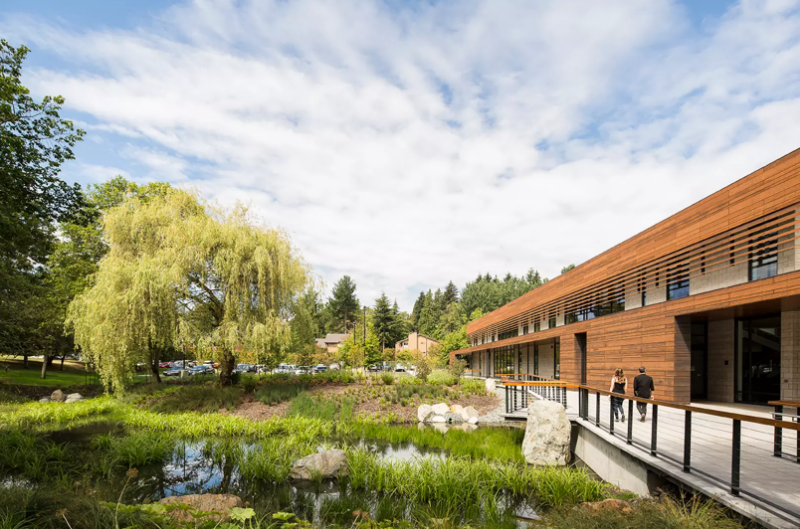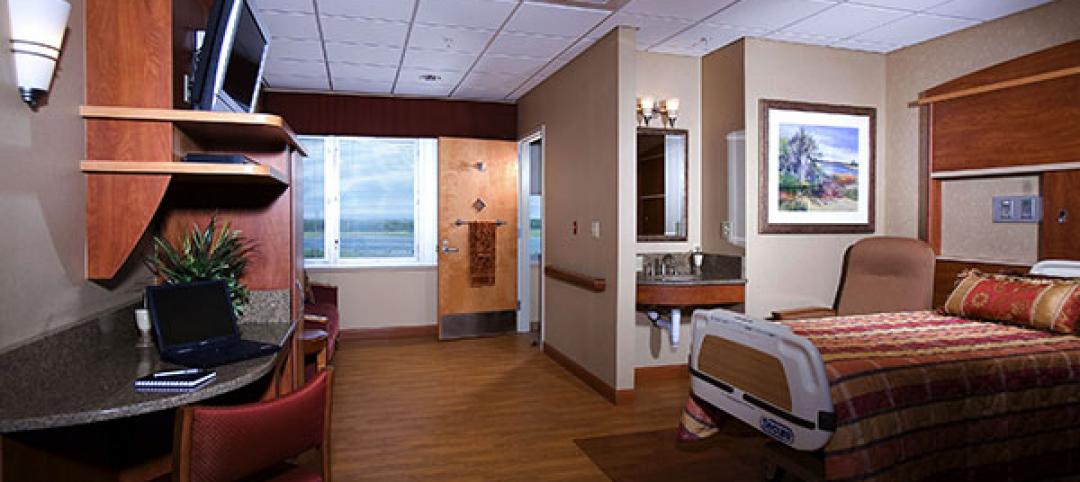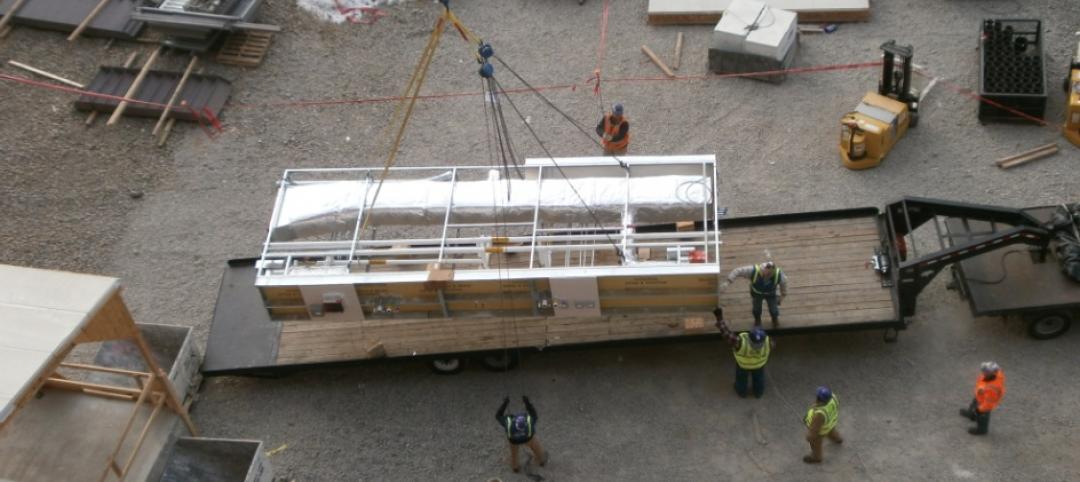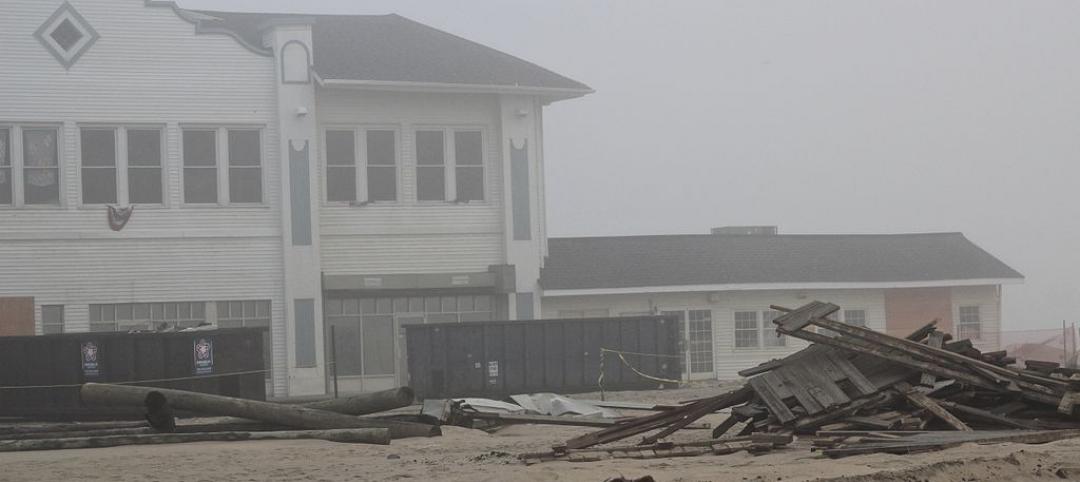The American Institute of Architects (AIA) Academy of Architecture for Health (AAH) has selected the recipients of the AIA Healthcare Design Awards program. The award program showcases the best healthcare building design and healthcare design-oriented research. Projects exhibit conceptual strengths that solve aesthetic, civic, urban, and social concerns as well as the requisite functional and sustainability concerns of a hospital.
Recipients were selected in four different categories:
Category A - Built: Less than $25 million (construction cost)
Category B - Built: More than $25 million (construction cost)
Category C - Renovations/Remodeled: Primarily built within existing hospital or clinical space
Category D - Unbuilt: must be commissioned for compensation by a client with the authority and intention to build
Category A
Harvey Pediatric Clinic; Rogers, Arkansas
Marlon Blackwell Architects
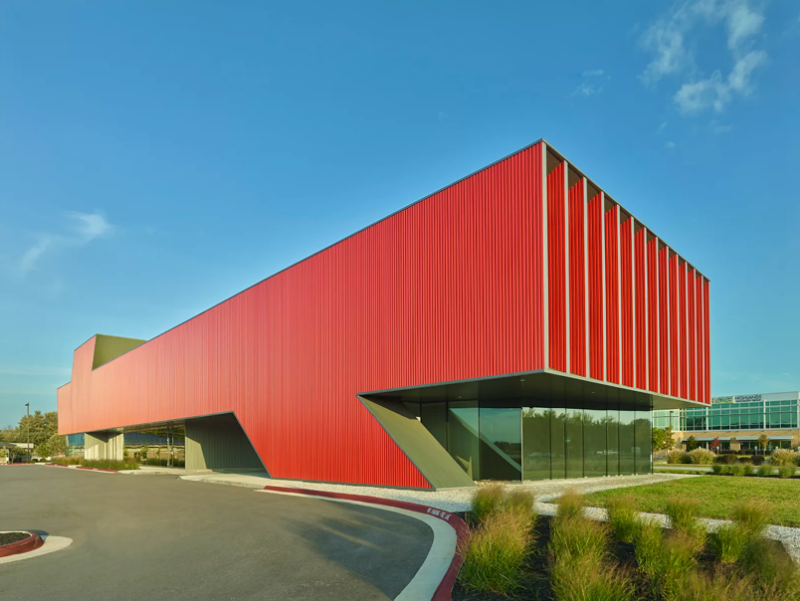 Photo: Timothy Hursley.
Photo: Timothy Hursley.
Situated in a fast-developing area, the Harvey Pediatric Clinic is an abstract figure set in contrast to the excess of materials, weak forms, and beige tones that make up the everyday suburban landscape that surrounds the building. The cayenne-color metal panel wraps the entire south side of the building, providing a strong identity for the practice. Patients enter the building, pass through and ascend a stair that is washed in blue light from the skylight above. Sixteen exam rooms are organized along a simple, clear circulation path defined by several skylights that bring natural light deep into the building.
Neighborcare Health, Meridian Center for Health; Seattle
NBBJ
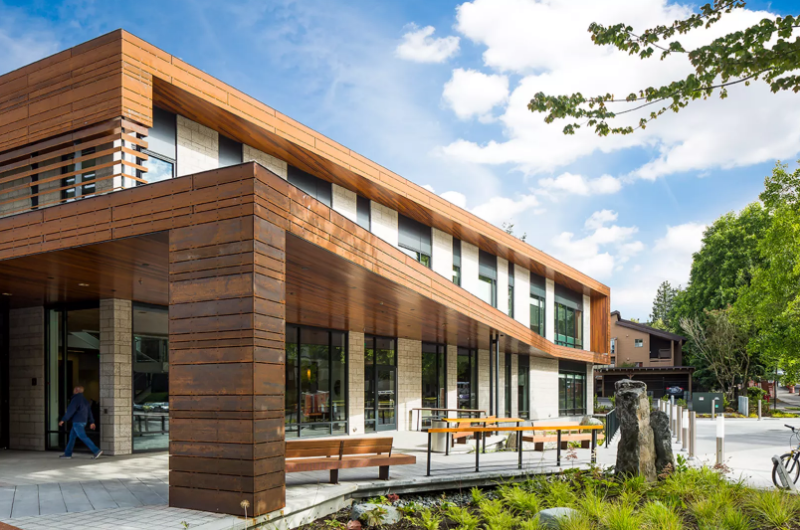 Photo: NBBJ/Sean Airhart.
Photo: NBBJ/Sean Airhart.
Partially funded by a federal grant, the Meridian Center for Health is a first of its kind: an integrated, one-stop model for health treatment and prevention for underserved Seattle-area residents. Uniting three health organizations under the same roof, the center provides low- to no-cost medical, dental, and mental health services for adults and children. Design elements include an open floor plan, a dramatic feature stair in the lobby, and a range of team and community spaces that remain available for neighborhood organizations after hours. The Center is tracking to receive LEED Gold certification.
Category B
Mercy Virtual Care Center; Chesterfield, Missouri
FORUM STUDIO
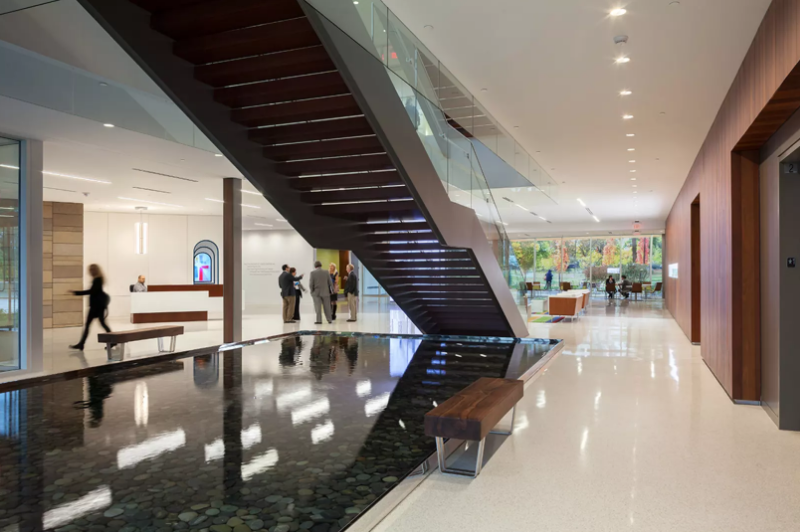 Photo: Sam Fentress.
Photo: Sam Fentress.
The Virtual Care Center exemplifies this Catholic health system’s bold commitment to the future of healthcare. This first-of-its-kind facility advances Mercy’s mission of transformative care while dramatically improving outcomes through improved patient management. The design blends the built with nature through an authentic use of materials and space. A palette of stone, glass, precast and wood coupled with flexible floor plates create an environment that fosters innovation, collaboration and patient centric care. The Virtual Care Center, the genesis of a national consortium of virtual providers, pioneers a new model of care.
UC San Diego Jacobs Medical Center; La Jolla, California
Cannon Design
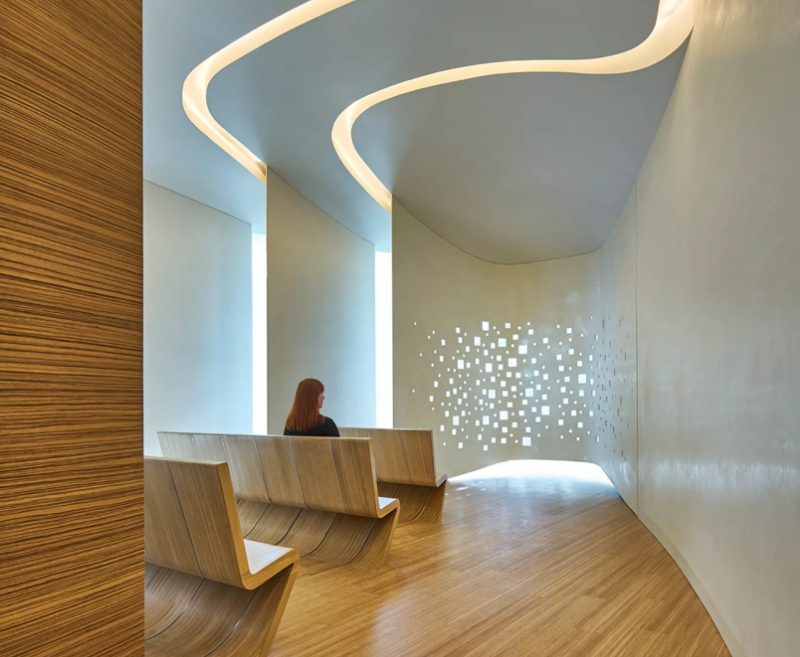 Photo: Christopher Barrett.
Photo: Christopher Barrett.
Reflective of UC San Diego’s vision toward the future intersections between technology and medicine, Jacobs Medical Center is designed as three hospitals in one with focus on women’s and children’s, cancer and specialty surgery. The tower is the cornerstone of a new campus identity focused on the future of health, pairing cutting-edge, modern medicine with best-in-class patient experience.
Category C
Advocate Lutheran General Hospital Cardiac Catheterization Suite; Park Ridge, Illinois
Philips Design and Anderson Mikos Architects
 Photo: Craig Dugan Photography
Photo: Craig Dugan Photography
The design team worked closely with key stakeholders to achieve Advocate Health Care Heart Institute’s goal of improved customer experience, safety, and outcomes. The new cardiac catheterization suite improves the way people receive care through the complete transformation of patient, family and staff experiences. The resulting optimized flow and journey includes a transradial recovery lounge, labs that inspire confidence while improving safety, and a first-of-its-kind prep/recovery bay solution that enables a less stressful recuperation personalized for each patient. The Advocate Experience has been redefined through the service and spatial design transformation for this Suite.
Bayshore Dental; Whitefish Bay, Wisconsin
Johnsen Schmaling Architects
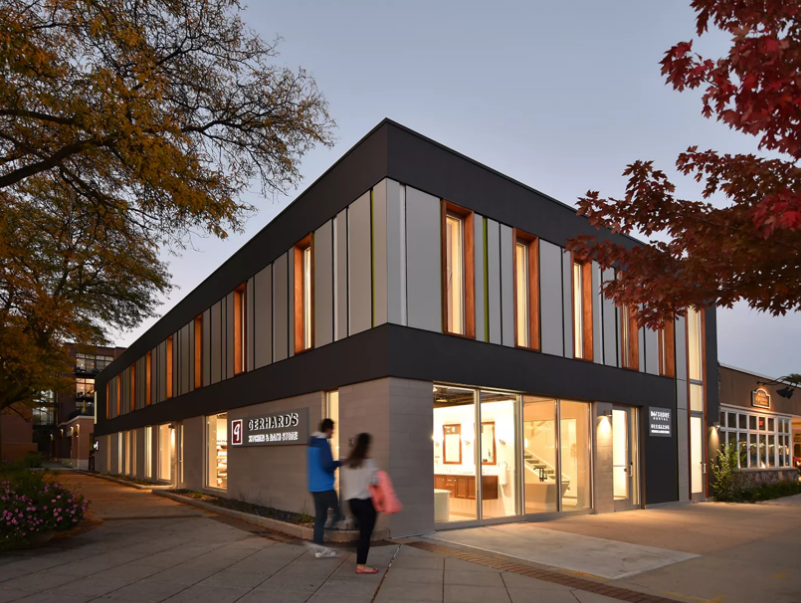 Photo: John J. Macaulay.
Photo: John J. Macaulay.
This project is the ambitious reinvention of an abandoned building and its transformation into a state-of-the-art clinic for a young dentist and her small staff. The project’s rigorous architecture and meticulous details echo the ethos of the flawless efficiency, uncompromising precision and exacting purity at the center of the innovative dentistry performed here. Procedural flow strategies informed the clinic’s overall layout. A continuous ceiling plane leads patients from the light-filled reception to the individual operatories, each marked by green vertical panels and light strips that animate the clinic’s central corridor. White oak cabinetry and green accents complement the intentionally restrained interior palette, all contributing to a deliberately serene ambience intended to appease a sometimes-apprehensive clientele.
Category D
Ambulatory Surgical Facility; Kyabirwa, Uganda
Kliment Halsband Architects
 Rendering: Kliment Halsband Architects.
Rendering: Kliment Halsband Architects.
This independent, off-the-grid ambulatory surgical facility is a replicable prototype for the five billion people in the world who lack access to safe or affordable surgery. The building is composed of three functional elements: a reception pavilion with offices grouped around a family waiting area courtyard, an intermediate pavilion for pre-op and post-op activities, and a sterile pavilion with two operating rooms and related support spaces. These elements are sheltered under a solar panel shade structure, inspired by the banana plants on the site.
Related Stories
| May 22, 2014
Big Data meets data centers – What the coming DCIM boom means to owners and Building Teams
The demand for sophisticated facility monitoring solutions has spurred a new market segment—data center infrastructure management (DCIM)—that is likely to impact the way data center projects are planned, designed, built, and operated.
| May 21, 2014
Evidence-based design practices for the palliative care environment
Palliative care strives to make patients comfortable as they are receiving treatment for a severe illness. As hospitals seek to avoid Affordable Care Act penalties for poor patient satisfaction, many expect this field to grow quickly.
| May 20, 2014
Kinetic Architecture: New book explores innovations in active façades
The book, co-authored by Arup's Russell Fortmeyer, illustrates the various ways architects, consultants, and engineers approach energy and comfort by manipulating air, water, and light through the layers of passive and active building envelope systems.
| May 20, 2014
Using fire-rated glass in exterior applications
Fire-rated glazing and framing assemblies are just as beneficial on building exteriors as they are on the inside. But knowing how to select the correct fire-rated glass for exterior applications can be confusing. SPONSORED CONTENT
| May 19, 2014
What can architects learn from nature’s 3.8 billion years of experience?
In a new report, HOK and Biomimicry 3.8 partnered to study how lessons from the temperate broadleaf forest biome, which houses many of the world’s largest population centers, can inform the design of the built environment.
| May 14, 2014
Prefab payback: Mortenson quantifies cost and schedule savings from prefabrication techniques
Value-based cost-benefit analysis of prefab approaches on the firm's 360-bed Exempla Saint Joseph Heritage Project shows significant savings for the Building Team.
| May 13, 2014
19 industry groups team to promote resilient planning and building materials
The industry associations, with more than 700,000 members generating almost $1 trillion in GDP, have issued a joint statement on resilience, pushing design and building solutions for disaster mitigation.
| May 11, 2014
Final call for entries: 2014 Giants 300 survey
BD+C's 2014 Giants 300 survey forms are due Wednesday, May 21. Survey results will be published in our July 2014 issue. The annual Giants 300 Report ranks the top AEC firms in commercial construction, by revenue.
| May 7, 2014
Design competition: $900,000 on the line in Las Vegas revitalization challenge
Las Vegas Mayor Carolyn Goodman wants your economic development ideas for remaking four areas within the city, including the Cashman Center and the Las Vegas Medical District.
| May 3, 2014
Health system capital planning for the future: The benefits of master plan portfolio analysis and ambulatory market modeling
Money continues to be scarce, yet U.S. health systems need to invest and re-invest in their physical future. Healthcare facilities planning experts from CBRE Healthcare outline tools and strategies for identifying where to best allocate precious resources.


